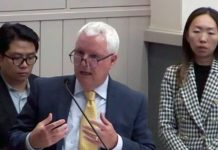
In record time and under strained circumstances, South Pasadena’s Finance Department assembled and on Tuesday won unanimous approval from the Finance Commission for a COVID-adjusted 2020-21 budget aimed at saving $3.5 million, or 12.5 percent, of general fund spending during the coming fiscal year.
The recommendation will be presented Wednesday, June 3 to the City Council, which is scheduled to adopt a final budget at its meeting on June 17. If approved, the city’s general fund budget will be $27.4 million, as compared to the originally anticipated $30.8 million figure that did not include COVID-19-inspired reductions in sales taxes, fees and other revenue. The new budget is designed to as flexible as possible given the uncertainty of revenue projections due to the pandemic.

During the meeting, City Treasurer Gary Pia complimented Finance Director Karen Aceves and her staff, observing the proposal worked in the opinions and priorities expressed by citizens during the city’s public engagement process. “This proposed budget doesn’t require any cuts to core public safety functions. It doesn’t reduce library hours. It doesn’t impact senior services. It doesn’t reduce tree planting or environmental programs and doesn’t require any pay cuts or layoffs of staff.”
Aceves deemed the public engagement process a success, saying each Power Point presentation the city posted received 1,000 “views” and that 130 online respondents filled out a survey enabling them to express priorities on 16 issues. She said that compared favorably to the several dozen attendees the city normally gets when conducting town hall-style budget forums. She and Pia both emphasized the survey’s finding that 81 percent of the respondents said they had never previously participated in a city budget outreach process.
The survey found a majority or plurality of respondents rating as “important” the following: crossing guard services (51%); teen center (39%); after school and summer Camp Med program (52%); senior nutrition (65%); children’s reading program (56%); community events such as concert-in-the-park and movies (52%); and environmental sustainability programs (59%).

Some programs thought to be more popular did not fare as well as expected, Aceves noted. According to the results, the following were found to be “not important”: police cadet program (47%); CERT Program (34%); self-defense courses (59%); bicycle amenities (46%); coordination of commercial filming (36%); public safety open house (51%); the online reading program (39%); cultural programming such as author night (46%); and community programming such as Breakfast with Santa (37%).
Here are cuts the staff proposed to reach the $3.5 million target:
Personnel $1,350,000. Over 50 part-time staffers have already been furloughed because they provided services prohibited by county health officer orders, but $520,000 can be saved by continuing the hold on five unfilled positions, including two in the city manager’s office. The city hopes but is wary that it can achieve $410,000 in savings with targeted retirement incentives (5 of 38 eligible candidates would have to accept).
The City will also “explore potential elimination” of $400,000 in 2-percent cost of living increases with existing contracted employees, though that will require negotiation with labor groups and would have to be in place by July 1. So will any further furloughs or layoffs, a last resort in case the economy does not rebound. This is also contraindicated because there would be service level reductions and impacts on the city’s ability to retain quality staff — problematic especially as city employees are already paid below the average in comparable cities.
If one-day-a-month furloughs were instituted for all non-public safety personnel, the city could save $400,000, Aceves said, though again that option, like layoffs, is not currently among the staff recommendations.
Commissioner Zhen Tao noted that in the budget recommendation, all departments are budgeted for about the same amount as the current year except police, which is higher. Aceves said that’s because recent negotiations brought wages in that department up to 95 percent of average, making the police the highest personnel costs in the city. The Department has also had other significant contract service expense increases, such as an additional $40,000, or 30 percent, increase in animal control services from the Humane Society, she said.
Capital: $1,000,000. The city is loath to decelerate what it says is the increase it has made to annual street maintenance, not only because deferred maintenance will inevitably mean higher costs later but because, barring a legislative fix now being sought, elimination of the $1 million in capital could risk about a half million dollars in supplemental state funding. Another $500,000 for street projects would be kept. Since capital projects are normally a year behind, Aceves said if other savings perform beyond targets, those amounts could be channeled back to street projects. A reprioritization of street repair projects is currently underway, she noted. In addition, there is another $700,000 in other state funding to be leveraged.
Designated Reserve: $600,000. Besides its emergency reserve balance, the city has designated reserves for about a dozen special projects such as stormwater, library expansion, Arroyo Golf Course, legal, pension, renewable energy and others. These total about $5.6 million. The staff is recommending elimination of the $600,000 storm water fund because it was set aside before the city had a consistent source of funding due to the Nov. 2018 passage of Measure W’s 2.5 cent per square foot parcel tax, which brings in about $300,000.
Operations: $350,000. The city will reduce travel, training and supplies across the board. It is eliminating “major contracts” such as those for communications and state lobbying. Council discretionary funds would be eliminated (but not their current balances) and there would be reductions in CERT, senior classes, library programs and purchases and the teen center. The reductions would also include $202,250 in Recreation and Youth Services community events such as concert-in-the-park and camp Med. While both were identified in the community survey as priorities, they had to be canceled under the county health orders. But Aceves said they would be brought back once the orders are lifted. It was unclear how their costs would be offset if they are brought back.
Overtime: $200,000. These cuts would be in the public safety departments. Aceves said these would be offset by recent increases in staffing levels, but that further reductions were not possible because the money is used to backfill vacation time, time off for injuries on duty — to which public safety departments are more prone – -and because some money must be set aside for brushfires or large scale investigations.
The city is also mulling longer term issues such as the possible restructuring of its Community Services department through merger into another city agency, the YMCA or as partnership with another city. Another is renewal of the utility users tax, now set to expire in June 2022 absent an affirmative vote next November by voters, and the problem of $2 million in additional pension liabilities due to pandemic-related investment losses.
We welcome your comments below, or by email: Media@SouthPasadenan.com















.png)











Still don’t see anything about the possible sale of the district school headquarters?
They have ongoing close session meetings without transparency to the public.
Try this: https://southpasadenan.com/budget-crisis-kills-projects-school-district-land-swap-and-city-hall-hotel-scrapped